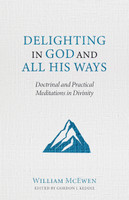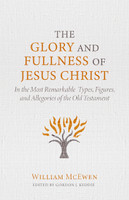Delighting in God and All His Ways
Description
Eighteenth-century minister William McEwen practiced the personal discipline of distilling his sermons into concise, accessible meditations. These essays combine to create a devotional tour of Christian doctrine. In ninety-eight brief entries, McEwen writes about systematic categories ranging from God’s perfections to death and eternity. Read this treasure trove of preached theology to see how knowing God will increase our delight in Him.
Endorsements
“William McEwen (1735–1762), like Robert Murray M‘Cheyne in the next century, was taken from his earthly ministry at a young age, but despite his early death, he was known as a man of exemplary piety and distinguished ability. These chapters give us preached scriptural doctrinal theology that is devotional and applied. It was said of McEwen (who was guided in his studies by Ebenezer Erskine and James Fisher) that his propositions were few but very weighty and edifying, his ‘explanations were clear and accurate, his proofs plain and decisive, his illustrations beautiful and entertaining, and his applications close and searching.’ Doesn’t that make you want to read and reflect on these expositions? The content of this book has been characterized as ‘a just and lively representation of true Christianity, in a variety of its most important articles’ so given ‘to enlighten the understanding and persuade the heart.’ May the gracious God of truth Himself use our study of the instruction of His Word expounded in this book to lead us to love from a pure heart, a good conscience, and a sincere faith (1 Timothy 1:5).”
—Ligon Duncan, chancellor and John E. Richards Professor of Systematic and Historical Theology, Reformed Theological Seminary
“McEwen’s writing provides a breath of fresh air. These are heart-stirring essays that possess the rare combination of depth, clarity, and sobriety. Since all the chapters are short, each one could easily serve as a catalyst for daily personal devotions or as a supplement to family worship. It is bite-sized systematic theology from a Presbyterian minister of the past whose work is well worth reading today.”
—Jonathan Master, president of Greenville Presbyterian Theological Seminary
“Having introduced a new generation to McEwen’s classic typological work The Glory and Fullness of Christ, Keddie, in this volume, acquaints modern readers with McEwen’s pastoral treatment of the key doctrines of the Christian faith. Taken from sermons preached during his short-lived ministry, each of McEwen’s brief chapters offers the best in catechetical-like preaching—an eternal truth served with exegetical precision, illustrative language, and heartwarming application. Set in a readable style, Delighting in God and All His Ways offers rich devotional fare to those who open up its pages.”
—Barry York, president and professor of pastoral theology and homiletics, Reformed Presbyterian Theological Seminary
“Like the short ministry of McEwen himself, these brief essays offer much in little. Many of them are themselves worth the price of the book. Here you can enter thoughts fresh from meditating deeply on Scripture truths and access a profound yet practical piety. They cover the length and breadth of Christian experience and practice. A few pages a day would enliven your devotion.”
—Matthew Vogan, editor of The King in His Beauty: The Piety of Samuel Rutherford
About the Author
William McEwen (1735–1762) served as minister of the gospel at the Associate Congregation in Dundee, Scotland. He studied divinity under Ebenezer Erskine and James Fisher, leaders in the Scottish secession from the national church.
---
The Glory and Fullness of Christ
Description
William McEwen is one of the forgotten writers of the Scottish church of the eighteenth century and one of the great popular exponents of a sound biblical typology. In this book, McEwen investigates numerous people, places, and things in the Old Testament and shows how they prefigure the Lord Jesus Christ. Each chapter exhibits a lively meditation, providing concise, conversational, and user-friendly explanations of each subject under review. If you wish to better understand how the Hebrew Scriptures point to Jesus, read McEwen on the types and prepare to delight in the glory and fullness of Christ.
Read Sample Pages
Endorsements
“MacEwen of Dundee we name by himself. He was one of the brightest ornaments of the Secession movement. He died at the early age of twenty-eight. But he left a book that embalms his memory.... This work deals with the types of Scripture in a vein of fine Evangelical teaching, and it is expressed in what was regarded as the classical English of the middle of the eighteenth century.... And such a high and dry Anglican churchman as Dean Burgon makes the rather grudging admission that the best book he knew in English on the types was by a Scotsman and a Presbyterian.” — John Macleod, in Scottish Theology
“This long-overdue republication of the once-famous ‘McEwen on the types’ fills a massive lacuna in current devotional and exegetical literature. Steering a careful middle course between the ancient hermeneutical rocks of allegorization and the modern shoals of dry academic dissection, this pastor-teacher takes us by the hand on a devotional journey through the Old Testament to illustrate Christ’s words, “These are they which testify of Me” (John 5:39). Preachers of Old Testament sermons will be challenged whether their work is done when they’ve simply checked the correct redemptive-historical boxes, and Christ’s sheep will be delighted to recognize the familiar voice of their Shepherd in persons, places, and things they perhaps never expected. Readers will not have to be persuaded by every typological detail of McEwen’s truly profound and unique work to be deeply blessed by these soul-nourishing meditations.” — David G. Whitla, professor of church history, Reformed Presbyterian Theological Seminary; and coauthor of Portraits of Christ
About the Author
William McEwen (1735–1762) served as minister of the gospel at Associate Congregation in Dundee, Scotland. He studied divinity under Ebenezer Erskine and James Fisher, leaders in the Scottish secession from the national church.






